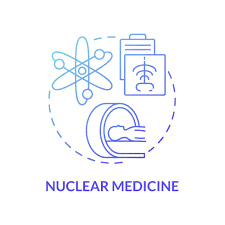
Introduction
Nuclear Medicine Technology (B.Sc NM) is a specialized medical field using radioactive substances to diagnose and treat diseases. It combines principles from physics, biology, and chemistry, making it essential in modern healthcare for early detection and treatment.
Core Principles
- Based on nuclear physics and molecular biology.
- Use of isotopes to track biological molecules.
- Key for detecting cellular abnormalities early.
- Benefits: Early detection of diseases.
- Limitations: Complex equipment required.
Radiopharmaceutical Preparation
- Radiopharmaceuticals are prepared for diagnosis.
- Targets specific organs or tissues for better imaging.
- Common isotopes: Technetium-99m, Iodine-131.
- Good: Targeted delivery of isotopes.
- Bad: Risk of radiation exposure.
Diagnostic Imaging
- Patients are administered radiopharmaceuticals.
- Gamma cameras or PET scanners detect gamma rays.
- Detailed images of blood flow, metabolism are captured.
- Good: Provides functional imaging.
- Bad: Limited anatomical details.
Therapeutic Interventions
- Radiation therapy to target and destroy tumors.
- Isotopes deliver radiation directly to cancer cells.
- Minimal impact on healthy tissue.
- Good: Precision in cancer treatment.
- Bad: Side effects of radiation therapy.
Molecular Imaging
- Used in research for visualizing disease mechanisms.
- Techniques include PET and SPECT for real-time analysis.
- Focuses on gene expression and molecular processes.
- Good: Helps in personalized medicine.
- Bad: High costs involved in molecular imaging.
Career Opportunities
- Opportunities in hospitals, research labs, pharmaceutical companies.
- Careers in imaging centers, and regulatory agencies.
- In demand for professionals in precision medicine.
- Good: High demand in the healthcare sector.
- Bad: Requires specialized training.